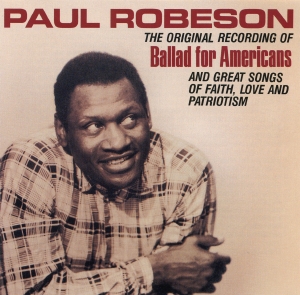
- Format: FLAC

In the absence of a multi-label Paul Robeson box, this 22-song CD is a superb account of the singer's late career, with one major work from his pre-blacklist years represented as well. In the late '50s, Robeson, like the Weavers -- who also were persona non grata at the major labels due to their leftist political views -- began recording for Vanguard Records, a New York-based independent label that wasn't afraid of controversial artists. These sides captured his last great years as an artist and reminded the public that the singer had not been silenced, despite his decade in the artistic wilderness. The material ranges from spirituals ("Deep River," "Go Down, Moses"), work songs ("Water Boy"), sea shanties ("Shenandoah"), classical compositions ("Jerusalem"), and traditional Irish and English folk songs ("Londonderry Air") to once-topical (and still relevant) songs such as Earl Robinson's "The House I Live In" (made famous in the mid-40s by Lauritz Melchior, Josh White, and Frank Sinatra). Robeson's voice is rougher and harder than it was in his prime, but he makes up for his lack of range with outstanding enunciation and projection, and he is equally impressive on the numbers done with solo piano accompaniment and those arranged for orchestra and chorus by Robert Decormier. The highlight of this collection, however, is the title track, "Ballad for Americans," which Vanguard can justifiably be said to have rescued from oblivion in the RCA-Victor catalog. Clocking in at ten minutes, the 1939 recording is a fascinating, still somewhat compelling concept work authored by Earl Robinson and John LaTouche, in which Robeson represents the entire country, all of "the people," in this grand musical canvas, supported by a chorus and a full orchestra. His voice is richer on this cut than on any of the other material here, understandable since it was recorded nearly two decades earlier, and the only drawback is that this piece -- by its nature as an overtly political, patriotic leftist work -- is as much acted as sung. One needed a larger-than-life vocal presence such as Robeson to pull this off. One can only be grateful for Vanguard's foresight in acquiring the quarter-century-old recording for this compilation in its original double-LP format, and to RCA-Victor (who were likely only too happy to let it go for whatever money they could get, at the time) for permitting its use; the song, although somewhat arch and pretentious at times, is a vivid reminder of the era in which Robeson made his name, and great battles for the hearts and minds of audiences were being fought daily. The sound on the Vanguard original recordings is excellent, despite this being one of the earlier LP-to-CD conversions from the catalog; "Ballad for Americans," a much older work recorded during the 78 rpm era, has some noise from its non-tape original source, and more limited audio range than the rest of the material, but is still eminently listenable and, at times, most striking in its structure and sensibilities.